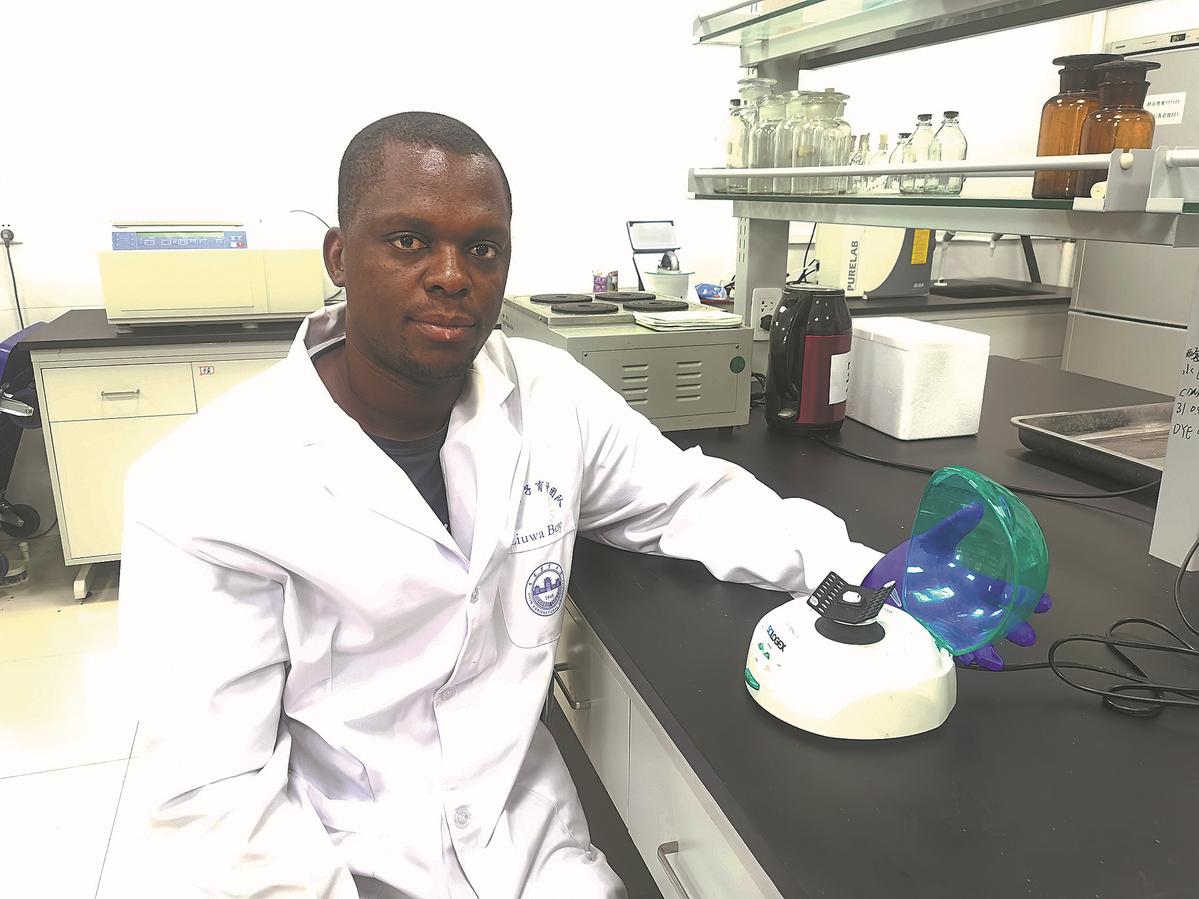


Simushi Liswaniso in his laboratory at Jilin Agricultural University in Changchun, Jilin province. CHINA DAILY
Standing beside an experimental field full of rice about to ripen in Changchun, Jilin province, Simushi Liswaniso is looking forward to enjoying the same scene at his hometown in Africa in the future.
Liswaniso, 35, an overseas doctoral student from Zambia, began studying at Jilin Agricultural University in Changchun in 2017. In 2016, as an officer of the department of fisheries and livestock, he attended a training course at the China Aid Zambia Agricultural Technology Demonstration Center located in his country.
"The one-month course was about goat production techniques for small scale farmers," he said. "The course helped me improve my knowledge on goat production and be able to train the local farmers effectively."
Since the establishment of the center in 2009, the university has dispatched over 30 experts and professors to provide training courses on agricultural mechanization, grain and legume seed production, edible mushroom cultivation, vegetable production and pest control.
Over 2,000 local students, including Liswaniso, have attended the training sessions.
"Food security used to be our biggest challenge," he said. "Traditional farming methods alone could not meet Zambia's growing food demand.
"The Chinese technology has updated my previous knowledge and inspired me to pursue further studies in China," he said. So he went to Changchun in 2017.
In the laboratory, he learned how to optimize crop growth using advanced technology, and in the field, he discussed crop improvement methods with agricultural experts.
"There is a huge difference between the agriculture in Zambia and China," he said, adding that the agricultural system in China is well developed and digitalized while it is still traditional in his country.
Learning the technologies is not just about increasing crop yields but also about addressing the increasingly severe challenges of climate change and soil degradation, he said. "The future of agriculture belongs to those who master advanced technologies."
In 2020, Liswaniso graduated and enrolled in a doctoral degree program.
In 2021, at the 8th Ministerial Conference of the Forum on China-Africa Cooperation, agricultural development and poverty reduction demonstration village construction became one of the "Nine Major Projects".
In 2022, as a project coordinator, Liswaniso participated in the China-Africa Agricultural Development and Poverty Reduction Demonstration Village project in Zambia led by Jilin Agricultural University.
Currently, in a village of Lusaka province, technologies for cultivating edible mushrooms and vegetables from China are being applied locally.
"The modern machinery and scientific management are helping villagers break away from traditional farming methods, improve food production and create new job opportunities," said Liswaniso. "Life of the villagers is getting better, and I feel immensely proud."
Since 2006, Jilin Agricultural University has hosted 40 foreign aid sessions, training over 900 senior agricultural managers from 74 developing countries, with over 400 participants from Africa.
Students from African countries such as Nigeria and Kenya gather to learn about techniques such as agricultural management and animal disease prevention and control in the university, hoping to take the knowledge back to their homelands.
Last year, the university established an Overseas Technology Academy in Zambia.
This year marks the 60th anniversary of the establishment of diplomatic relations between China and Zambia.
Jilin Agricultural University was selected for the Ministry of Education's China-Africa 100 Universities Cooperation Program, and is about to launch more extensive agricultural technology promotion initiatives in Africa.
"The deepening of agricultural cooperation between the two countries has further strengthened my mission — to spread China's agricultural technologies across the vast lands of Africa," said Liswaniso.
"I hope I can complete my studies in the summer of 2025 and return to my hometown. I will practice all the skills I have learned in China and also train fellow Zambians for the betterment of my country."
Han Junhongcontributed to the story.
点击右上角![]() 微信好友
微信好友
 朋友圈
朋友圈

请使用浏览器分享功能进行分享
